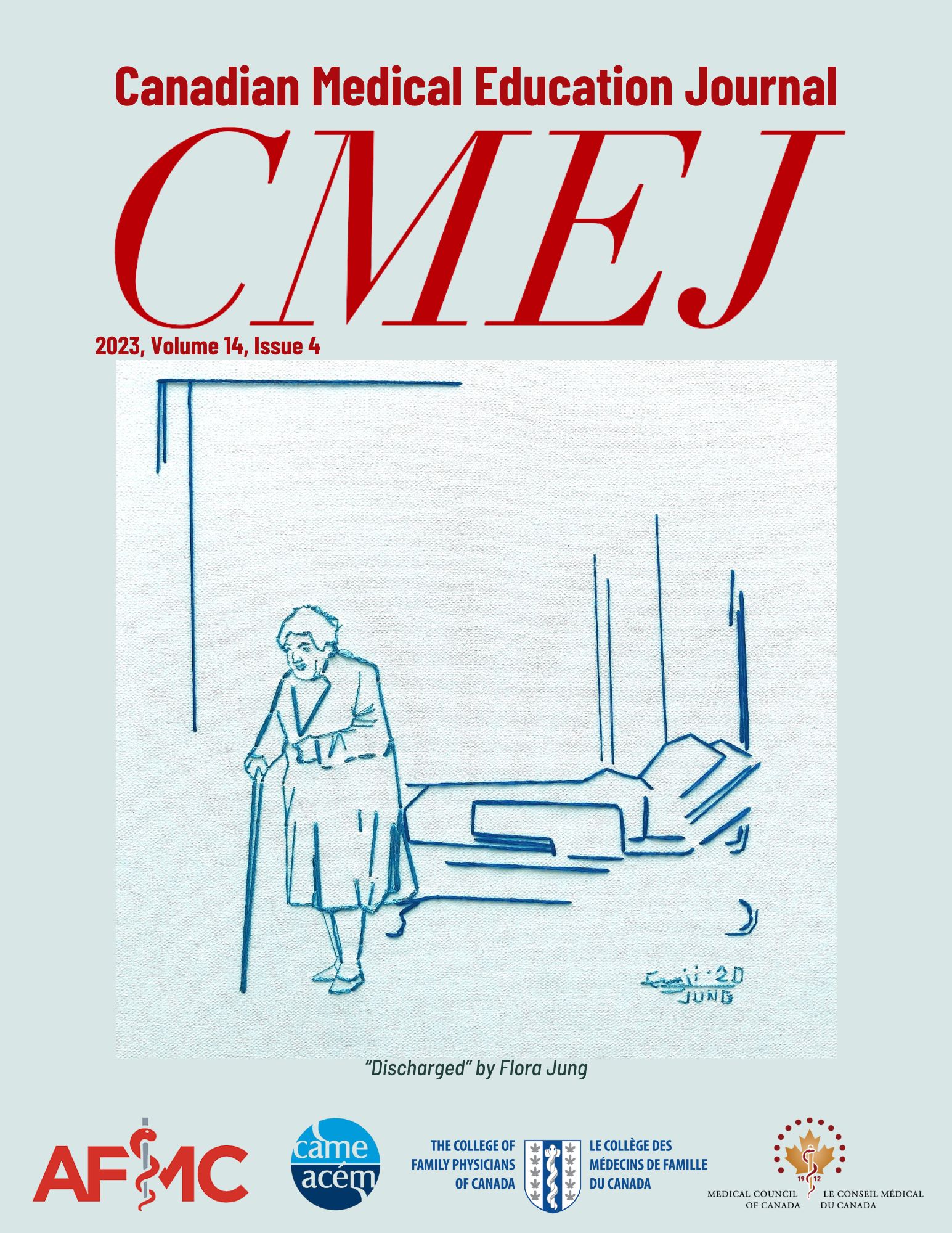Exploring the culture of faculty development: insights from Canadian leaders of faculty development
DOI:
https://doi.org/10.36834/cmej.75752Abstract
Background: Although the word culture is frequently mentioned in research on faculty development (FD), the concept is rarely explored. This research aimed to examine the culture of FD in Canada, through the eyes of leaders of FD in the health professions. Studying culture can help reveal the practices and implicit systems of beliefs and values that, when made explicit, could enhance programming.
Method: FD leaders from all Canadian medical schools were invited to participate in semi-structured telephone interviews between November 2016 and March 2017. The researchers used a constructivist methodology and theoretical framework located within cultural studies, borrowing from phenomenological inquiry to move beyond descriptions to interpretations of participants’ perceptions. Constant comparison was used to conduct a thematic analysis within and across participants’ interview transcripts.
Results: Fifteen FD leaders, representing 88% of medical schools (15/17) in Canada, participated in this study. Four themes characterized the culture of FD: balancing competing voices and priorities; cultivating relationships and networks; promoting active, practice-based learning; and negotiating recognition.
Conclusion: Although the culture of FD may vary from context to context, this study revealed shared values, practices, and beliefs, focused on the continuous improvement of individual and collective abilities and the attainment of excellence.
References
Steinert Y. (Ed.) Faculty development in the health professions: a focus on research and practice. Netherlands: Springer. 2014. DOI: https://doi.org/10.1007/978-94-007-7612-8
Lewis LD, Steinert Y. How culture is understood in faculty development in the health professions: a scoping review. Acad Med. 2020;95(2):310-319. https://www.doi:10.1097/ACM.0000000000003024 DOI: https://doi.org/10.1097/ACM.0000000000003024
Calzada PJ, Shaw DE. Assessing the cultural character of an academic department of family medicine. Osteopathic Family Physician. 2011;3(1):10-16. https://doi.org/10.1016/j.osfp.2010.05.005 DOI: https://doi.org/10.1016/j.osfp.2010.05.005
Mutabdzic D, Mylopoulos M, Murnaghan ML, Patel P, Zilbert N, Seemann N, et al. Coaching surgeons: is culture limiting our ability to improve? Ann Surg. 2015;262(2):213-216. https://doi.org/10.1097/SLA.0000000000001247 DOI: https://doi.org/10.1097/SLA.0000000000001247
McLean M, McKimm J, Major S. Medical educators working abroad: a pilot study of educators’ experiences in the Middle East. Med Teach. 2014;36(9):757-764. https://doi.org/10.3109/0142159X.2014.909583 DOI: https://doi.org/10.3109/0142159X.2014.909583
Lacey-Huan LC, Whitehead TD. Leading change through an international faculty development programme. J Nurs Manage. 2009;17(8):917-930. https://doi.org/10.1111/j.1365-2834.2008.00955.x DOI: https://doi.org/10.1111/j.1365-2834.2008.00955.x
Betancourt JR. Cross-cultural medical education: conceptual approaches and frameworks for evaluation. Acad Med. 2003;78(6):560–569. https://doi.org/10.1097/00001888-200306000-00004 DOI: https://doi.org/10.1097/00001888-200306000-00004
Farrow J, Morris M. Cultural studies. In Guba N, Lincoln Y, editors. Handbook of qualitative research, 2nd ed. London: Thousand Oaks; 2000.
Lemke JL. Textual politics: discourse and social dynamics. London: Taylor & Francis; 2006. DOI: https://doi.org/10.4324/9780203975473
Boréus K, Bergström G. Analyzing text and discourse: eight approaches for the social sciences. Los Angeles: Sage Publications, 2017
Alasuutari P. Researching culture: qualitative method and cultural studies. London: Sage Publications; 1995.
Butler-Kisber L. Qualitative inquiry: thematic, narrative and arts-informed perspectives. Los Angeles: Sage Publications; 2010. DOI: https://doi.org/10.4135/9781526435408
Friese S. Qualitative data analysis with ATLAS.ti. Los Angeles: Sage Publications; 2014.
Kolomitro K, Hamilton J, Leslie K, et al. Viewing faculty development through an organizational lens: sharing lessons learned. Med Teach. 2021;43(8):894-899. https://doi.org.1080/0142159X.2021.1931078 DOI: https://doi.org/10.1080/0142159X.2021.1931078
Wagener A. The deconstruction of culture: towards an interactional triad. J Intercult Communication. 2012; issue 29. URL: http://immi.se/intercultural
McLeod PJ, Steinert Y. The evolution of faculty development in Canada since the 1980s: coming of age or time for a change? Med Teach. 2007;32(1):e31-e35. https://doi.org/10.3109/01421590903199684 DOI: https://doi.org/10.3109/01421590903199684
O'Sullivan PS, Irby DM. Reframing research on faculty development. Acad Med. 2011;86(4):421-428. https://doi.org/10.1097/ACM.0b013e31820dc058 DOI: https://doi.org/10.1097/ACM.0b013e31820dc058
Baker L, Leslie K, Panisko D, et al. Exploring faculty developers' experiences to inform our understanding of competence in faculty development. Acad Med. 2018:93(2):265–273. https://doi.org/10.1097/ACM.0000000000001821 DOI: https://doi.org/10.1097/ACM.0000000000001821
Royal College of Physicians and Surgeons of Canada. Faculty development resources. https://www.royalcollege.ca/rcsite/cbd/cbd-faculty-development-e. [Accessed July 2022]
Lupton KL, O’Sullivan PS. How medical educators can foster equity and inclusion in their teaching: a faculty development workshop series. Acad Med. 2020;95(12s):s71-s76. https://doi.org/10.1097/ACM.0000000000003687 DOI: https://doi.org/10.1097/ACM.0000000000003687
Geertz C. The interpretation of cultures: selected essays. New York: Basic Books; 1973
Downloads
Published
Issue
Section
License
Copyright (c) 2023 Lerona Dana Lewis, Yvonne Steinert

This work is licensed under a Creative Commons Attribution-NonCommercial-NoDerivatives 4.0 International License.
Submission of an original manuscript to the Canadian Medical Education Journal will be taken to mean that it represents original work not previously published, that it is not being considered elsewhere for publication. If accepted for publication, it will be published online and it will not be published elsewhere in the same form, for commercial purposes, in any language, without the consent of the publisher.
Authors who publish in the Canadian Medical Education Journal agree to release their articles under the Creative Commons Attribution-Noncommercial-No Derivative Works 4.0 Canada Licence. This licence allows anyone to copy and distribute the article for non-commercial purposes provided that appropriate attribution is given. For details of the rights an author grants users of their work, please see the licence summary and the full licence.











